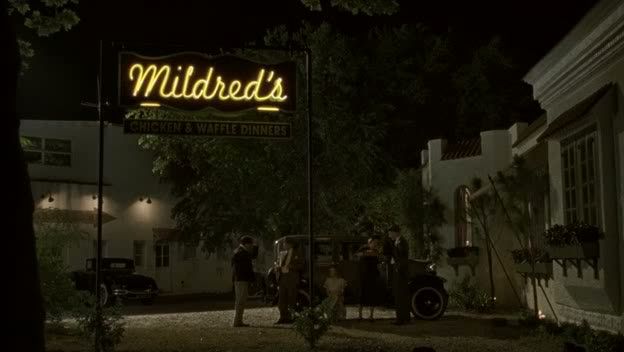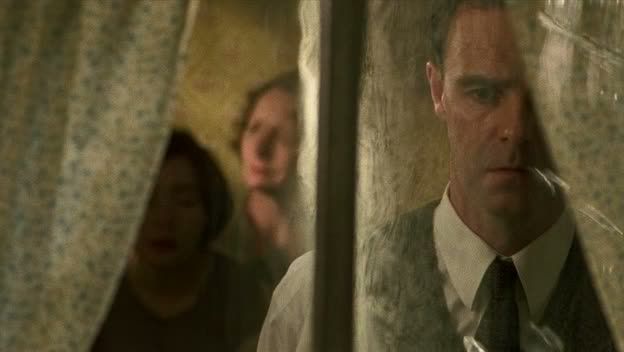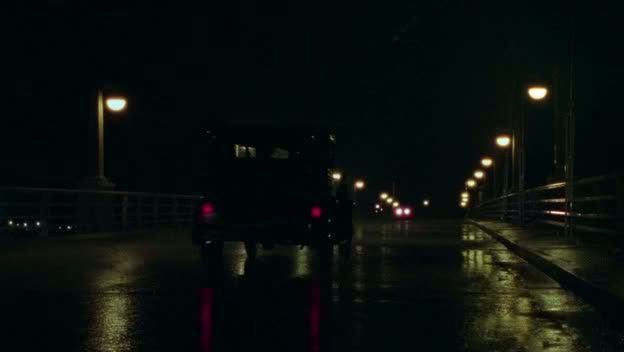

episodes 1-2 | episode 3 | episodes 4-5
The third episode of Todd Haynes' new Mildred Pierce miniseries opens in the immediate wake of the second episode's tragic conclusion. The younger daughter of Mildred (Kate Winslet) died at the end of the second episode, which concluded with a discrete pan away from Mildred embracing her surviving daughter Veda (Morgan Turner), and the third part of the series doesn't gloss over this grief but draws it out, lingering lovingly and sadly over the details. In the opening shot, Haynes' camera pans across Veda's sunlit room, the morning after the last episode's conclusion, and the sunny cinematography, the bright child's toys and decorations, are enough to suggest that maybe it was all a bad dream, until the moment when Mildred's gaze lands on the empty bed of her other daughter, at the same moment as Haynes guides the audience's gaze to the same spot.
In the subsequent scenes, Mildred balances her grief against the practicality and determination that constitute her essential nature; even when she's at her darkest moment, sobbing and despairing, she has the presence of mind to think of the need for a black dress. Haynes frames this moment in one of the through-a-window shots that characterize his style in Mildred Pierce, with Mildred's husband Bert (Brian O'Byrne) in the foreground and Mildred in the background with her friend Lucy (Melissa Leo), discussing her dress size and whether she should wear a veil or not. Soon, Mildred must lay out the clothes her daughter will wear to be buried, and she carefully lays out the clothes on the bed, smoothing out the wrinkles in a dress and placing a pair of socks down one by one. After the funeral, Haynes mirrors this sequence with a shot of Mildred similarly laying out her funereal black dress, straightening it out and hanging it up in the closet, putting it away as though she could put away her grief so neatly. In its quiet, methodical way, this opening is more devastating than a more showy, melodramatic evocation of grief, because it's so horrifyingly normal.
The emotions enter a more melodramatic register later in the episode, but Haynes' emphasis on details remains a constant presence. As in the first two parts of the series, Haynes keeps calling wry attention to the economics of the time, as even after Mildred gets her restaurant up and running, she still has to keep careful track of her money, counting every dollar. More than the first episodes of the series, Depression-era politics linger in the background here, with political speeches playing on radios and the end of Prohibition triggering changes for Mildred's business. The economics of the time are also at the forefront, as Haynes again takes every opportunity to demonstrate how much things cost at this time, taking particular ironic pleasure in a stop to a gas station where a full tank of gas costs a little over a dollar.


The bulk of this pivotal episode, however, focuses on the relationship between Mildred and the fading society heir Monty Beragon (Guy Pearce), who has retained his status and the significance of his family name even while losing all of his money. As he result, he takes money from Mildred even while looking down on her, mocking her status as a lowly working woman. In that, he has a co-conspirator in Veda, who has her own pretensions of upper-class privilege, and who naturally rejoices at Monty's presence in her mother's life. The scenes between Monty and Mildred dominate this episode, as their initially passionate and intense relationship is corrupted by Monty's disdain for work, and his contempt for Mildred's working class lifestyle. In several scenes, the couple argues, trading cutting words as Mildred begins to realize that Monty is not the man she thought he was, until Monty defuses the situation by seducing Mildred.
Despite it all, Mildred still desires him, and Monty knows that at this point, sex is the one thing he still has to offer — though he jokes that he's a gigolo, it often seems to be more or less true. These scenes are painful to watch, to see this strong woman, who's worked so hard and dealt with so much, brought down by this guy who's outwardly smooth and suave but actually quite pathetic. The thing is, Mildred, unlike so many other movie incarnations of the "strong woman," doesn't turn off or suppress her sexuality in the name of her career or her family — she might be making the wrong choice with Monty, but she's making it because she remains a sexual woman throughout all of her troubles. Probably the most telling moment in that respect is the scene when Monty shows up at Mildred's restaurant, preceded by buzz and excitement over his presence, with Mildred's two other men, Bert and her business manager/lover Wally (James LeGros), wondering how such a high society legend heard about the restaurant. When Monty then casually enters the kitchen and addresses Mildred intimately and familiarly, bringing her flowers, Mildred turns and suppresses a wicked smile in a napkin. Rather than being embarrassed or awkward, she's thrilled, proud, showing off Monty like a conquest, taking pleasure in introducing him to Bert and Wally. There's a social-climbing aspect to this pleasure, sure, the thrill of having this access to high society that the others clearly envy, but it's also the thrill of showing off her sexual prowess.
Haynes ends the episode with Mildred finally rejecting Monty's advances, driving to see him and then back home again in a lovingly photographed thunderstorm that externalizes Mildred's anger and confusion. On the way there, toward Monty's spacious but disused mansion, where most of the rooms are closed up, the furniture covered in white sheets, the stormy night seems to glow with eerie headlights illuminating accident scenes and slick roads. On the way back, after Monty flippantly jokes about raping Mildred — she momentarily gives in only to push him off and run away — the night has become even more threatening, even more sinister. The night seems to close in on Mildred, dark and intense, the roads narrow and surrounded on all sides by dark tangles of trees and foliage that seem to press in on her. That's an appropriate place to end this transitional episode that bridges the gap between the opening two hours and the next (and final) two episodes, which promise to leap forward several years into the future. Haynes' Mildred Pierce continues, in its precise and evocative way, to ably balance the naturalism of Haynes' period details against the creeping melodrama that's starting to emerge from the character interactions.









0Awesome Comments!